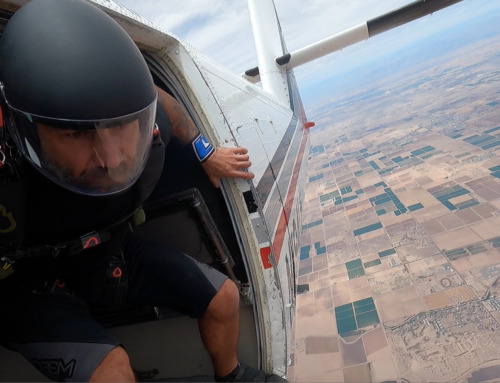By Damien Rider
Ultra-endurance athletes train to increase oxygen capacity to help build the stamina required to push through challenging events– many of which carry on for hundreds of miles and multiple days. Having a strong, expansive oxygen capacity also helps to remain calm under pressure and maintain the energy needed to continue pushing the mind and body to new limits.
“One instance that comes to mind where a strong oxygen capacity and calm long breaths saved my life. There is no doubt in my mind that this training method saved my life when I paddled 800km (500 miles) from Gold Coast to Bondi Beach in Sydney, Australia for 17 days. Each day had its challenges while I paddled by hand nonstop for 13 hours each day, facing extreme elements and wild ocean swell. One of the most challenging, terrifying parts of this event was being stalked by sharks, knowing that being attacked and either severely injured or killed was a very real possibility. Through these developed techniques, which gradually expands your oxygen capacity level by level, is exactly what I used to continue and get through these shark-infested waters and encounters without succumbing to fear and anxiety day after day, keeping a calm focus momentum.”
Everyone can benefit from a healthy, expansive oxygen capacity. You don’t have to be an endurance athlete or be chased by a shark for it to benefit the high-pressure situations in your own life. In the next blog, we’re going to talk more about these benefits to motivate you to stay dedicated to your breath connection.
The Benefits of Increasing Your Oxygen Capacity
1. Better Brain Function
Think back to the last time you connected with your breath- work. Take a moment to reflect on all the conscious decisions made during your practice. You aren’t simply breathing but deciding that you’ll notice every breath. You consciously decide to inhale, hold, and exhale. You decide to count how long it takes to expand each breath. You decide to observe your mind and body while breathing. You decide to endure potential distractions, refocusing on the breath, and integrate mindfulness into your practice.
Breathwork not only involves your entire respiratory system, but it also involves your mind.
Oxygen capacity, brain function, and physical performance are all connected. According to Dent Neurological Institute, the brain uses at least 20% of the oxygen in our body– and the harder we think, the more it needs to use.
Each progressive lesson of the increased oxygen capacity teaches you to take longer, deeper breaths. Your natural breath pace may be between 9 and 12 breaths per minute, and gradually continue from there to 4 to 5 breaths per minute. You will need to reprocess the natural subconscious breathing pattern without force. This breathing method is experienced, intuitive, science-based, and has been processed and developed since 1984. These lessons have been broken down into a simple form, to allow you to fully connect to the breath and achieve a meditative state in a much shorter amount of time than traditional meditation. You can work and live within this state, not needing a separate space and time for your practice but being able to take them with you on the go. You can process your thoughts, learn, and make calm and calculated decisions better.
2. Increased Endurance & Stamina
The number one cause of shortness of breath, feeling weak and fatigued from a workout is having a short, limited oxygen capacity. The National Library of Medicine explains the connection between decreased oxygen and muscle fatigue, so that we can see how not properly breathing and getting a nice flow of oxygen uptake into the muscles makes us sorer and more exhausted from exercise.
The more oxygen you breathe, the more it’s able to get into your muscles and break up lactic acid that causes soreness, cramping, and fatigue. This activity means that practicing your breath connection–meditation and using it before your workout can decrease your recovery time and improve your athletic performance, whether you work out for recreation or play a sport professionally.
Keep track of the progress you make in fitness just by changing the way you breathe and observing how you feel on your rest days by adding this practice to your recovery routine.
3. Less Anxiety, More Energy
Unlike caffeine, your breath can invigorate and awaken your body and mind, providing vital energy, without causing anxiety or using any addictive substances that cause crashes later. Through your practice of these lessons, you can feel both extremely calm and totally awake at the same time in an active meditative state. a calm yet productive focus.
When real or perceived threats cause stress in your life, your sympathetic nervous system jumps into action to perform its job: to keep you safe from that threat. A series of biological responses occur, one of the biggest ones being shortening and quickening your breath. We now also know that short, quick breathing itself can also turn on the sympathetic nervous system, so even when there is no threat present, your body still feels the effects of stress.
After being stressed out for a long period of time, think about how exhausted you get. You have a short fuse, leading to a negative attitude, poor communication, and lack of physical energy. By consciously using this practice, you’re correcting this pattern, rewiring your brain, and giving yourself more energy and less anxiety at the same time.
4. Strengthened Immune System
Deep breathing helps stimulate the lymphatic system, which is responsible for filtering toxins, waste, and sickness out of the body. By releasing carbon dioxide through full, complete exhales, you’re allowing this important system to perform its job more easily.
Additionally, a smaller study showed that deep breathing may contribute to positive anti-inflammatory responses and therefore increase the immune system. According to researchers in the Netherlands, “these results could have important implications for the treatment of conditions associated with excessive or persistent inflammation, such as autoimmune diseases.”
Although there’s still much to be discovered on this subject, I’m hopeful and excited for science to catch up and continue to reveal even more about how breathwork improves our physiological and psychological wellbeing.






